[Image: Eckhard Pecher | Creative Commons]
The common assumption is that “Nintendo” (任天堂) means “leave luck to heaven” or even “to leave one’s fortune in the hands of fate.” Those assumptions, however, could be wrong.
In Japan, Nintendo’s official logo still uses the kanji characters 任天堂, so it’s important to understand what they could have originally meant to company founder Fusajiro Yamauchi. For all the company’s logo changes, this is a constant for Nintendo Co., Ltd.
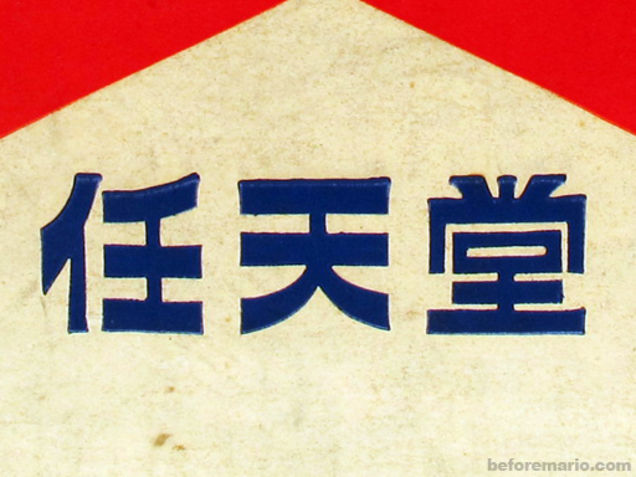
[Image: Before Mario]
The phrase “Nintendo” is said to refer to is「運を天に任せる」(“un wo ten ni makaseru”) or, as it’s often translated, “leave luck to heaven” or as “leave fate to heaven.” As Kotaku also mentioned in this article, that doesn’t take into account the association the individual kanji characters have in Japanese, nor does it take into account Nintendo’s history.
The interpretation of “ten” (天) in Nintendo is typically viewed from a literal point-of-view, with “ten” (天) being defined as “heaven.” As mentioned in The History of Nintendo by Nintendo Dream writers Florent Gorges and Isao Yamazaki, “ten” (天) contains the same kanji character as used in the word for the mythical being Tengu (天狗). Below is a statue of Tengu. What’s the connection?
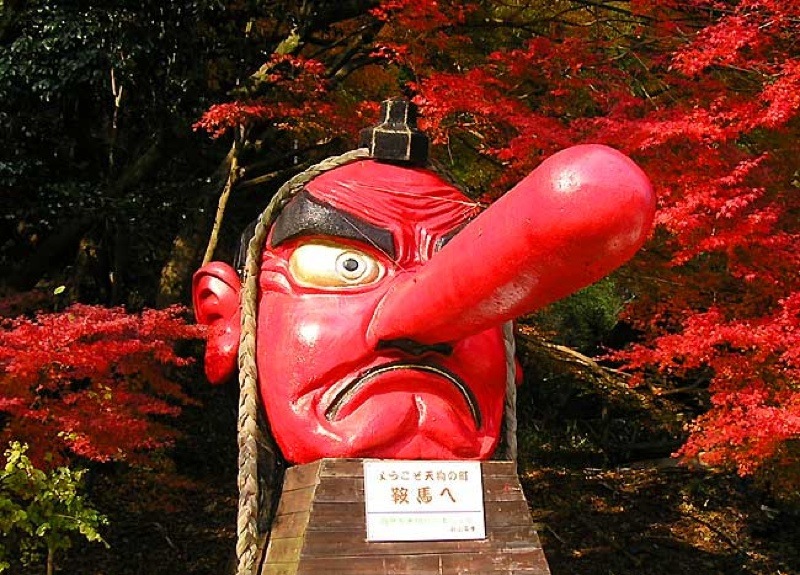
[Image: Biglobe]
The History of Nintendo 1889-1980: From Playing-Cards to Game & Watch explains that when Nintendo was originally founded in the late 19th century, then company president Yamauchi was brainstorming ways to get his company out of a hanafuda sales slump. The company’s pricey cards were not doing well, so Yamauchi came up with the idea of selling lower quality cards under the name of “Tengu.” In 1889, Fusajiro Yamauchi had founded the establishment 任天堂骨牌 or “Nintendo Koppai,” with “koppai” meaning “cards.” (Note: the characters 骨牌 can also be read as “karuta,” also meaning “playing cards.”)
The selection of Tengu was no accident. Tengu was already a symbol for playing cards and illegal gambling. The reason for this is that the Tengu character has a long nose, and the Japanese word for “nose” (hana) is pronounced the same as the word for “flower” (hana). The playing cards Nintendo was making, hanafuda (花札), uses the kanji for flower, because each card is covered in different flower. According to The History of Nintendo, those visiting the pleasure quarters of Osaka and Kyoto would rub their nose as a sign that they were looking for gambling games. For card players, “ten” meant “Tengu,” which meant “gambling.”
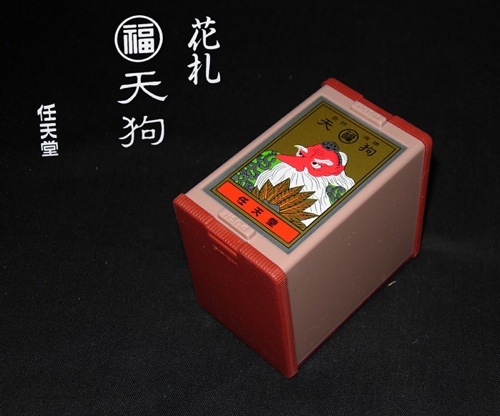
[Image: Nintendo]
The connection between hana and Tengu would not have been lost on Yamauchi.
However, it’s not possible to discount the importance of “luck” or rather, “good fortune” for Nintendo. The old Kyoto headquarters is covered with the kanji character “fuku” (福). “Fuku,” however, is different from “un” (運) in the “leave luck to heaven expression.” In Japanese, “fuku” is “good fortune,” “happiness,” or referring to “being lucky,” while the word “un” refers to “fortune” and “luck.” It’s undecided. That’s an importance difference.
The company was later incorporated as Yamauchi Nintendo Unlimited in 1933. Then in 1949, it established Marufuku Co., Ltd after World War II once the sale of foreign playing cards, banned during the war, resumed. The headquarters for this building is the “old Nintendo heardquarters” fans visit in Kyoto. Marufuku Co., Ltd. was a sales and marketing operation. The reason why the kanji “fuku” (福) is all over this building in circles is because “maru” means “circle” in Japanese.
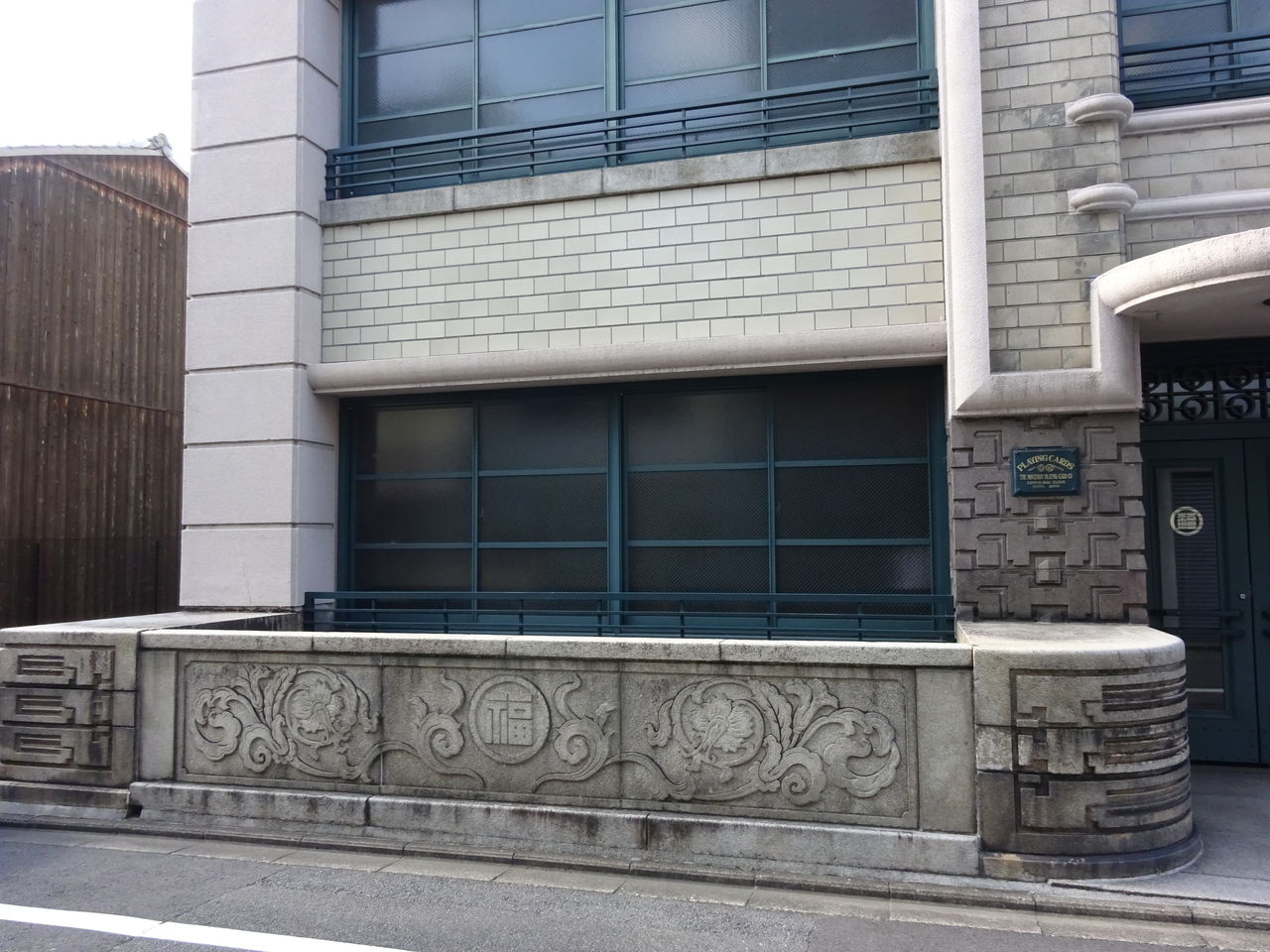
On the wall out front is the kanji character “fuku” (福). [Image: Hodohodo]
In photos from blog Hodohodo, you can see the character fuku (福) in a circle all over the building. You can also see the company name “Yamauchi Nintendo” (山内任天堂). There are reasons for this.
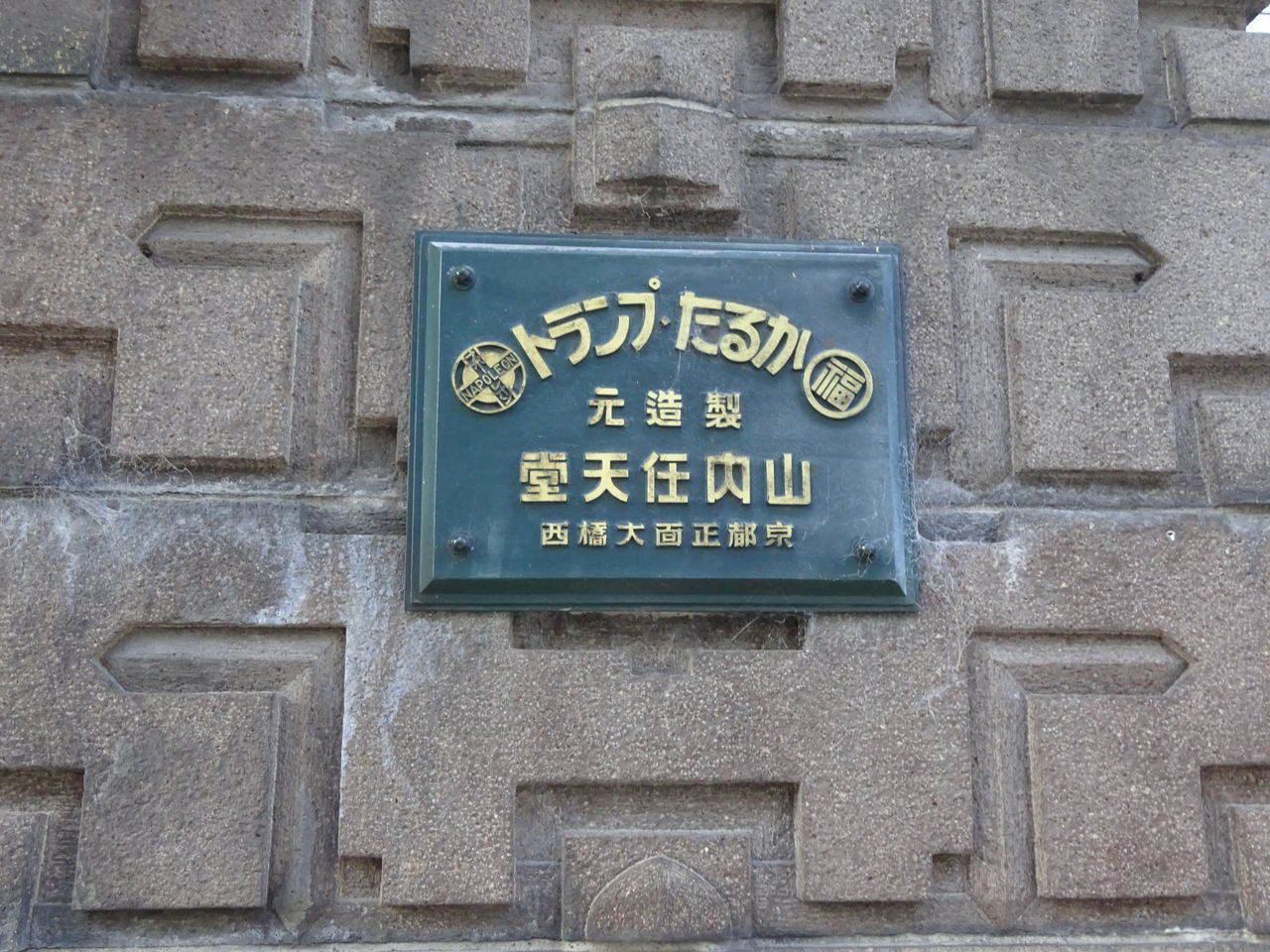
The Japanese words are written right to left, while the foreign word “Trump” as in loan word for Western style cards is written left to right. [Image: Hodohodo]
There are five decades between when the “Nintendo” was coined and when this company was dubbed Marufuku, so the use of “good fortune” doesn’t necessarily explain any nuances in the meaning of Nintendo.
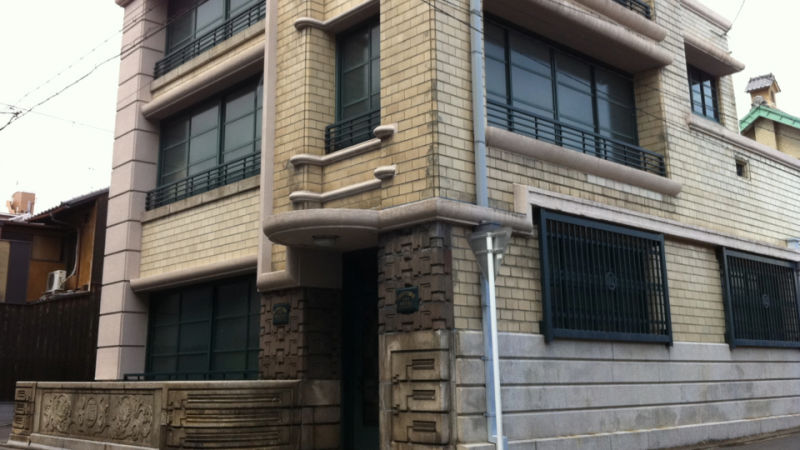
[Photo: Brian Ashcraft]
In 1951, the company’s name was changed to Nintendo Playing Card Co., Ltd and then finally to its current moniker Nintendo Co., Ltd in 1963. According to the book, “do” (堂) — which means “shrine” or “sanctuary” — is frequently used by Japanese companies to add prestige to their name. It’s not uncommon to see Japanese supermarket chains or bookstores with “do” (堂) at the end of their names to add prestige to their name. (“Shop the Temple of Savings!”) If one translates “nin” (任) as “let someone do,” as Gorges and Yamazaki have, the word “Nintendo” (任天堂) could then mean “the temple of free hanafuda” or “the company that is allowed to make (or sell) hanafuda.”
“Nin” (任) can also refer to “duty” or “obligation,” with much weightier connotations. However, according to other experts, “nin” (任) has an even more overt etymological connection: it could be a nod to the actual gamblers that played hanafuda. Tokyo Vice writer Jake Adelstein asked two current members of the yakuza how they interpreted the company’s moniker. Their opinion was exactly the same. It’s apparently commonly thought that the “nin” (任) in Nintendo is the “nin” from “ninkyo” (任侠) or “chivalry”. According to Adelstein, “The yakuza don’t think of themselves as criminals, because they argue that they are ninkyo dantai, aka humanitarian groups.” The concept of chivalry, or ninkyo, is synonymous with the yakuza. “Whether true or not, they claim that the ‘nin‘ (任) character in ‘Nintendo’ (任天堂) comes from the word ‘ninkyodo‘ (任侠道) or ‘chivalrous way’, which is how the yakuza think of themselves,” says Adelstein. “Like many things, only the founder really knows.”
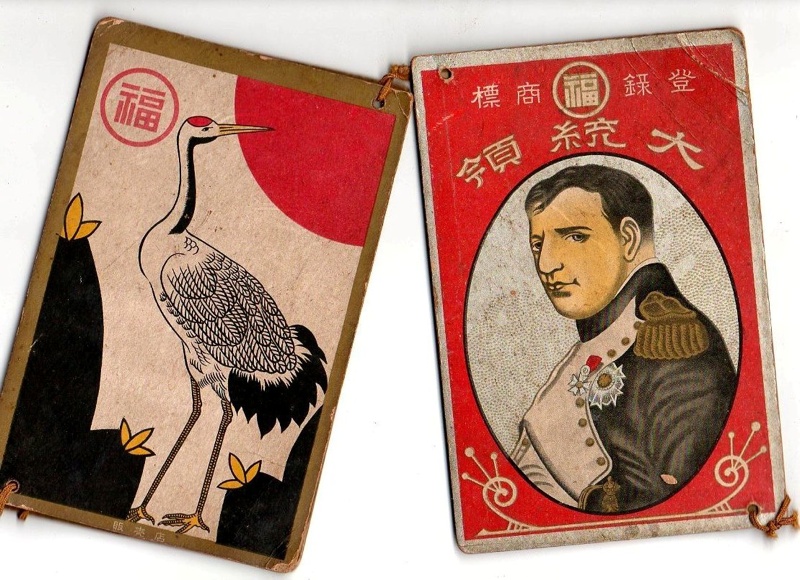
These Nintendo playing cards date from the 1960s. [Image: Bicycle]
As The History of Nintendo points out, Hiroshi Yamauchi, the great-grandson of the company’s founder, admitted that even he does not know the true meaning of the company’s name, saying that “to leave one’s luck to heaven” was a “plausible explanation.” Plausible, sure. Likely? Probably not.
“Plausible” and easier to explain than going through historical context. The book does acknowledge that there are no archives or historical records that can validate or invalidate interpretations of the company’s name.
This article was originally published on September 28, 2010. It has been updated and expanded.
The History of Nintendo 1889-1980 was written by Florent Gorges in collaboration with Isao Yamazaki. Gorges, who writes for Japanese magazine Nintendo Dream, was involved in the organisation of the Nintendo Museum exhibition in Osaka in 2007. He also heads up Pix’n Love Editions, which published a French edition of my book on Japanese game centres, Arcade Mania.
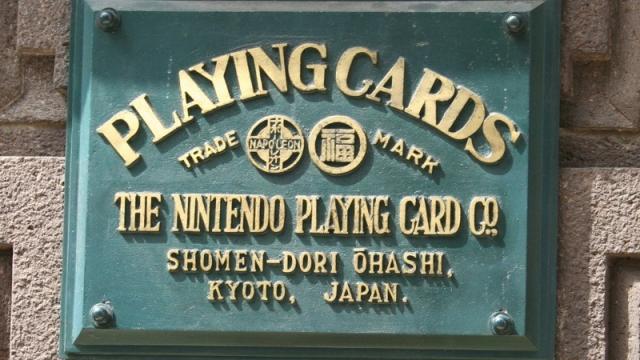
Comments
9 responses to “‘Nintendo’ Probably Doesn’t Mean What You Think It Does”
Actually, it is a little-known fact that 任天堂 literally means “Successful in spite of itself”.
Here I am pleased with myself that I was able to read the letters for かるた (but still had to look up what the word meant). I think I need a few years more Japanese practice.
I recommend Memrise (free/paid app) for language memorisation. Currently using it for Japanese/Korean/Mandarin. It uses the principle of a little learning each day beating a large but infrequent investment of time. Use it for 5-10 mins each day (or more!) and watch your Japanese ability grow, literally overnight.
I’ll check it out. I’ve been using DuoLingo, they added Japanese as an option a few months ago. It’s slow going, I’m only about 25 characters into hiragana and I keep forgetting half of them, but at least there’s progress!
Don’t know if this will help you but there is a series of games out there called Learn Japanese to Survive.
So far there are two: Hiragana Battle and Katakana War. Haven’t played the second one yet but the first is a J-RPG style game and you battle by typing the right sound for the symbol that appears.
The first is pretty good and pretty much had me knowing nearly the whole Hiragana alphabet in a week. And yes, I’ve forgotten it all as I put practice off due to heavy work commitments.
I think I bought the hiragana one a while back, I’m planning to check that one out as well.
Can’t be worse than my progress. Been trying on and off for 10 years and still haven’t mastered it.
Haha! You win the internet today my friend!
Any confusion is unintentod…
I thought it meant: “Compelling games, innovative hardware, minimal stock”
God I love Nintendo, don’t ever change haha